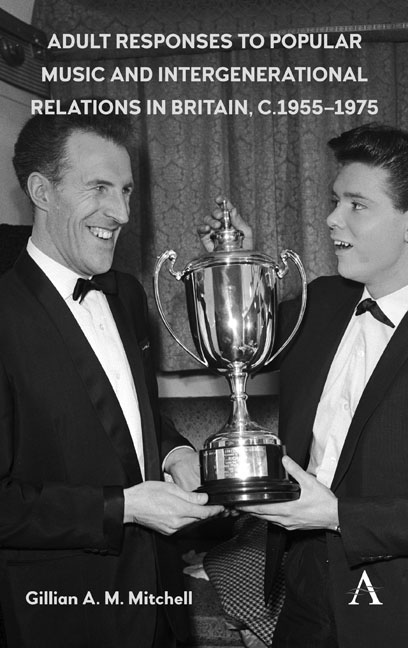Book contents
- Frontmatter
- Contents
- Acknowledgements
- Introduction
- Chapter One ‘You Go Half Way, Don't You?’ Family Life, Generational Identity and Popular Music
- Chapter Two ‘To Have Done Something’: The Christian Churches, Youth Clubs and Popular Music
- Chapter Three ‘You've Got to Be Able to Entertain People’: The Encounter between Popular Music and the Worlds of Variety and ‘Light Entertainment’
- Conclusion
- Notes
- Bibliography
- Index
Chapter Two - ‘To Have Done Something’: The Christian Churches, Youth Clubs and Popular Music
Published online by Cambridge University Press: 27 March 2019
- Frontmatter
- Contents
- Acknowledgements
- Introduction
- Chapter One ‘You Go Half Way, Don't You?’ Family Life, Generational Identity and Popular Music
- Chapter Two ‘To Have Done Something’: The Christian Churches, Youth Clubs and Popular Music
- Chapter Three ‘You've Got to Be Able to Entertain People’: The Encounter between Popular Music and the Worlds of Variety and ‘Light Entertainment’
- Conclusion
- Notes
- Bibliography
- Index
Summary
Introduction
On 24 March 1964, A Man Dies, a musical play depicting the passion and death of Jesus Christ, was performed at the Royal Albert Hall in London. This work, intended as a modern, experimental depiction of the Gospel, largely entailed actors miming to the accompaniment of a spoken narrative, but most conspicuous was its use of contemporary, popular- style, music to enrich the unfolding story. The media frequently dubbed the work a ‘rock ‘n’ roll Passion Play’, but this label did not reflect the array of contemporary musical styles utilized in the production. The songs, some directly adapted from Biblical passages, and others offering social and moral commentary in the tradition of the Mediaeval Mystery Plays, variously embodied almost every musical trend which had made its presence felt in Britain from the late 1950s onwards – from calypso, folk music and skiffle to ‘beat’ and, indeed, rock ‘n’ roll. The play had been steadily growing in fame since its rather more modest premiere performance in a church hall in 1960. An abridged version of the production, when filmed for television in 1961, attracted considerable media attention; although it caused a brief, minor outcry, as one politician campaigned for the banning of its broadcast, by the time it featured on the stage of the Royal Albert Hall, the majority of the most vociferous public objections had receded. The play largely gained acceptance as a legitimate and influential theatrical offering, with new productions continuing to be staged by other groups around the country for the remainder of the 1960s and beyond.
The manner in which the play used popular music for dramatic effect remains, in retrospect, one of its most striking aspects. Considered within the context of the period, and particularly bearing in mind the early 1960s origins of the work (it predated the experimental ‘rock opera’ or ‘concept album’ by several years), it was, in many ways, a daring and innovative move, and one which would be much admired and imitated. Some commentators traced a direct lineage from this production to Jesus Christ Superstar and Godspell, two subsequent, large- scale Christian- themed musicals. However, what is perhaps even more remarkable about A Man Dies was the fact that its original cast comprised not professional actors, but teenage amateurs from the youth club of St. James's Presbyterian Church in the postwar residential area of Lockleaze, Bristol.
- Type
- Chapter
- Information
- Adult Responses to Popular Music and Intergenerational Relations in Britain, 1955–1975 , pp. 65 - 106Publisher: Anthem PressPrint publication year: 2019



